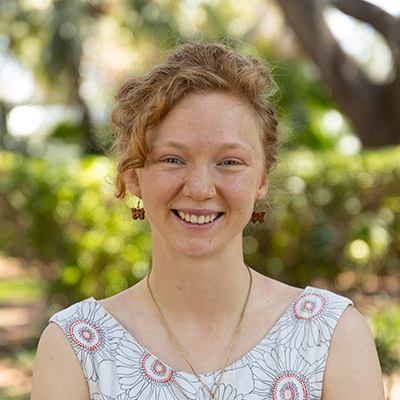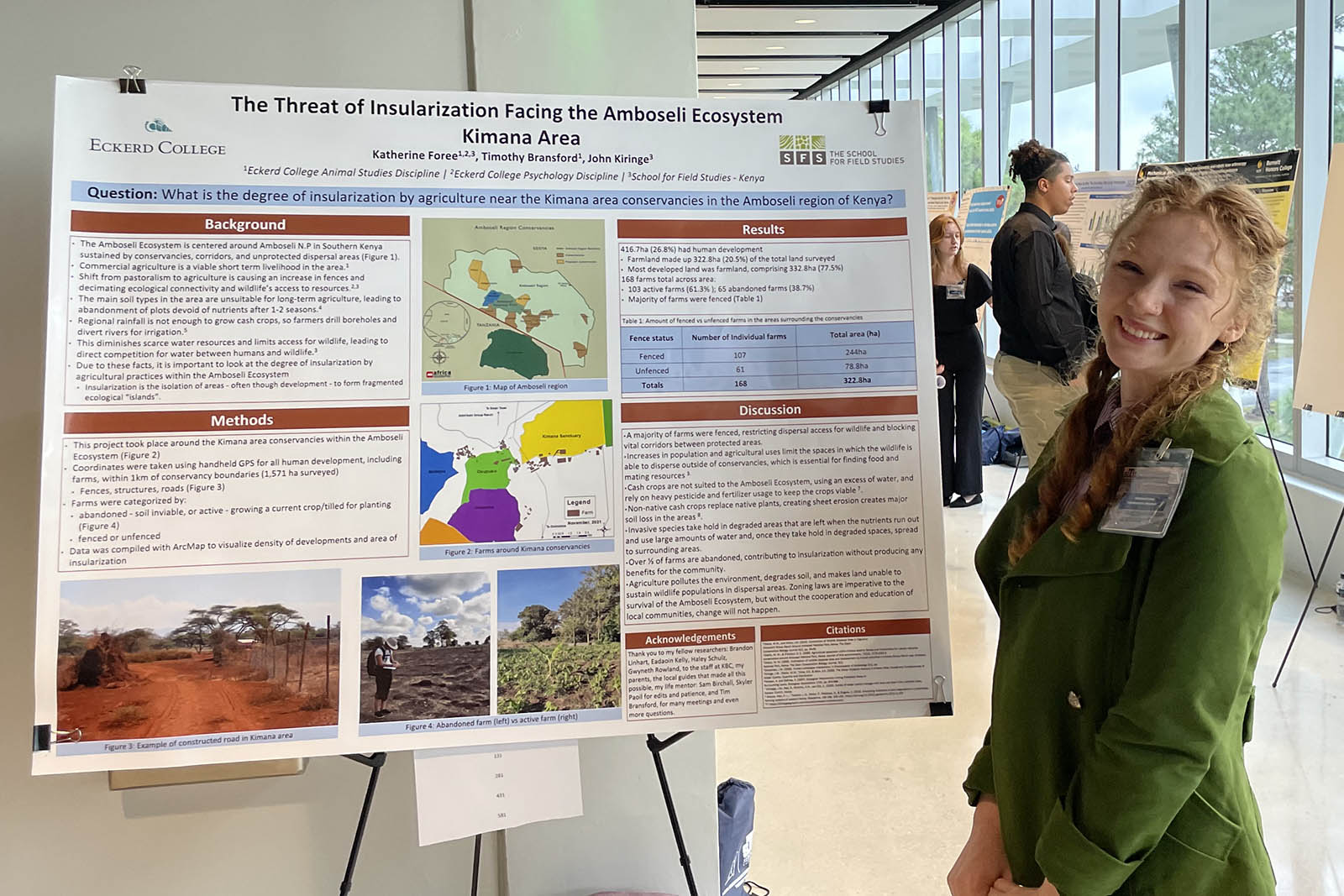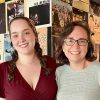Kat Foree ’23 presents her poster at the recent Florida Undergraduate Research Conference. Photo: Michael Goyette
When Kat Foree was in middle school, she wanted to dye her hair different colors, a fashion statement that unfortunately violated the school’s dress code. “So I spent three months getting the dress code changed,” she says.
Later, after she enrolled at Eckerd College, she decided in the fall of 2021 to go abroad. “Despite international protests that Africa was unsafe and rife with COVID, I took a leave of absence so they couldn’t stop me running off for three and a half months in Kenya,” she explains. “It was an accelerated studies program with School for Field Studies. We got to interact with the local communities, go on expeditions, do directed research and try not to get eaten by lions.”
And then last summer, when she had a few months to spare, she borrowed a friend’s RAV4 and set out by herself on an 8,000-mile road trip, taking one giant lap around the United States. “My friends kept telling me I was brave to go alone,” she says with a chuckle, “but I think I’d have more trouble if I brought people along. It just underscored that if I want to do something, I can do it. Landing back at Eckerd was a relief from the daily tent setup, but I was still itching to explore.”

Katherine “Kat” Foree
It’s that sense of adventure, curiosity and self-reliance that helped Katherine “Kat” Foree, a senior animal studies and psychology student from Austin, Texas, earn a prestigious Fulbright Research Award recently. Kat will travel next year to Peru to study giant river otters. She is the 34th student in Eckerd’s history to receive the award.
The Fulbright Research Award is one of the most widely recognized international exchange programs in the world, supported for more than half a century through an annual appropriation from the U.S. Congress and by the people of partner nations. Applicants for the awards design their own projects and typically work with advisers at foreign universities or other institutes of higher education.
Kat will be working from the Cocha Cashu Biological Station, part of the Manu National Park in southeastern Peru. Getting to the station will require two flights, a day on a bus and two days on a riverboat. “I’ll be looking at the rates of food sharing and theft among the otters’ extended family groups,” Kat explains, “I want to see if the rates change between areas used for gold mining and protected areas.” The project will start in March. In the interim, she’ll be studying lemurs in Myakka City, Florida.
Her journey to the Fulbright started more than a year ago when Kat began the application/interview process by working with Kathleen Robinson, Ph.D., Eckerd’s assistant dean of faculty. Not only is Kat’s Fulbright Award a major accomplishment, Robinson says, “It also speaks to Kat’s dedication and focus. Kat has applied for and been considered for a number of competitive awards at Eckerd. She experienced a lot of disappointment as she often narrowly missed winning, yet she kept applying and kept working on her writing and applications—and ultimately, she was successful with the Fulbright.
“Kat’s Fulbright Award to Peru is a celebration of her hard work, dedication and devotion to herself and the future,” Robinson adds. “She truly understands that the power is in the process.”
Kat was one of 12 Eckerd students who traveled recently to St. Thomas University in Miami Gardens to take part in the annual Florida Undergraduate Research Conference. The students presented their research along with more than 600 other undergraduates from around the state. The Eckerd cohort was one of the largest among colleges of Eckerd’s size. Kat presented “The Threat of Insularization Facing the Amboseli Ecosystem–Kimana Area Conservancies.”
Why Peru and giant river otters next? “I spent the first six years of my life working, and playing, on a service project with my parents in Rio Bravo, Mexico,” Kat explains, “so I have a good Spanish language foundation. Working with that, I looked around South America and found a biological station that’s in the middle of the Amazon rainforest. The station manager was wonderful and told me about all the projects running out of the station, and the idea of studying giant otters really intrigued me.
“It was a wonderful bonus that it was in Peru, so renowned for its biodiversity and welcoming attitude towards those who want to research it.”
In the end, the Fulbright was a team effort. Along with Robinson, Tim Bransford, Ph.D., assistant professor of animal studies at Eckerd, wrote letters of recommendation for Kat and met weekly with her. He also connected her with researchers in Myakka City and encouraged her to join his orangutan project and make it an independent study.
“The Fulbright is a prestigious, competitive award, and Kat is over the moon to have received one,” Bransford says. “It means she gets to participate in an amazing international collaboration and sets her up perfectly for grad school or other advanced opportunities.
“Eckerd prides itself on our global education component, and having a student receive a Fulbright shows that the College is a leader in training future global scholars.”













